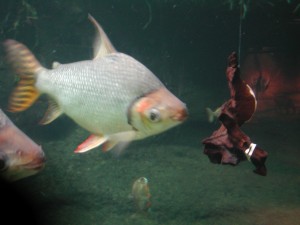Feeding your fish the right kind of food for maximum profit and growth is as important as providing the right environment for your fish at your fish farm. We will discuss the food necessary for the right type of fish and growth and help you make the right choices for your fish tank or fish farm.
Feeding your aquarium or fish tank fish
Most fish owners that grow fish in an aquarium make the mistake of over feeding the fish. The simple rule of thumb is to feed your fish what they can eat in five minutes and remove the rest. By removing everything that is not eaten by the fish, you can eliminate many common problems caused in the aquarium by leaving food in it, such as cloudy water, growing bacteria, diseases and so forth. Observing the quality of water in your aquarium or fish tank can give you indications that something is not working right. Many of the water quality related problems in your fish tank can develop gradually and needs regular monitoring and testing of water, such as testing for pH balance, parasites or worms, etc. color of your fish tank water is a good indication for the water quality. Your water should be clear and without any green or white cloudy color.
Choosing the right diet for your fish
It is very important to know what type of fish you are growing in your fish tank and what they were born to eat. Feeding them the wrong food will not only make them suffer, but also retard their growth and cause health problems. Not all food is suitable for every type of fish you grow. Different types of fish are born to eat different food, and therefore, learn the type of fish you have in your tank. Some fish have very specific need and so require special diet. For example, you might have a tank full of freshly hatched and grown fries that need starter feed.
When to feed your fish
Your fish may also eat at specific times depending on their habits, which you need learn also. Placing your food at the right spot for them to eat is also important. Some fish will eat from the top of the water surface; others will eat from a specific place inside the tank. Therefore, if you have the type of fish that like to graze from inside the tank, make arrangement for them so that they can eat naturally. It is also important to know when to feed your fish. Even though most fish will eat during the daytime, there are also a few types of fish that will eat only at night.
Variation in diet
 Instead of feeding the same type of food to your fish, add variation in their food. Your fish is going to live the variation and just like humans, it will add to the various types of food group needed for their balanced growth and all round health and well being. A combination of all sorts of food such as live, dried, and frozen food will ensure a balanced diet for your fish.
Instead of feeding the same type of food to your fish, add variation in their food. Your fish is going to live the variation and just like humans, it will add to the various types of food group needed for their balanced growth and all round health and well being. A combination of all sorts of food such as live, dried, and frozen food will ensure a balanced diet for your fish.
Making feed from locally available ingredients
Instead of going to a food supply store for fish, you could probably find some food around the house. Make some fresh food for your fish out of corn flour or regular flour, rice, or bread. You can also add some insects or worms for your fish if you have carnivorous fish in your tank. Make sure you have the guidelines for the types of food your fish will eat. If you have a gold fish in your tank, your fish will mostly eat vegetables, such as peas or such as diet, no meat.
To raise fish in your fish tank, you must know all about your fish. This includes the type of fish you have, their eating habits, their diet, and also at what stage they are in. some fish might require special diet at special stages. it is also important to maintain and monitor the quality of your tank water to ensure proper environment and growth of your fish, and also to keep diseases away. While feeding your fish, it is important also not to over feed them and take all the excessive food out because excess food often causes most of the tank related problems.
Hope you enjoyed reading our blog. We would love to hear from you regarding our blogs, so please leave a few words in the comment box that would greatly inspire us. We would also like to know if you have any questions or comments on any of our blogs. So please let us know what you think about these articles.
Source: WorldWide Aquaculture





Another tip is to skip feeding about one day a week. Most fish can actually go quite a while without food and so skipping a day here and there gives the filtration time to catch up on any excess.